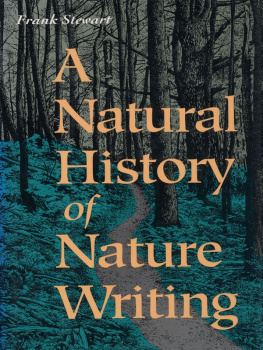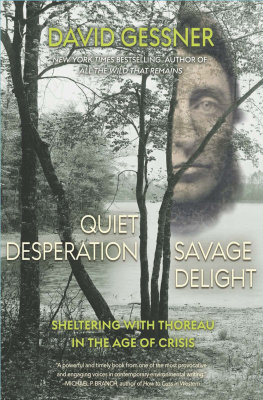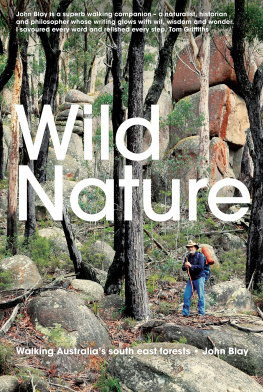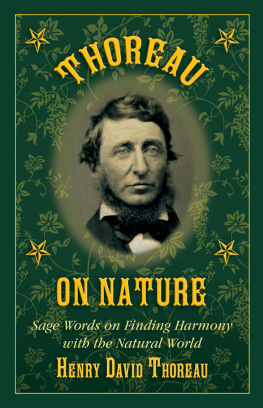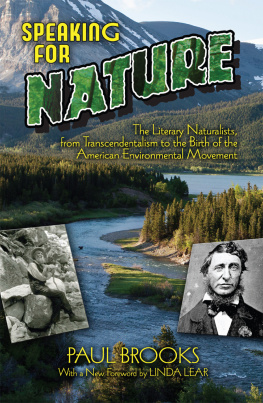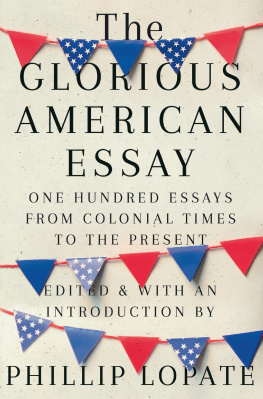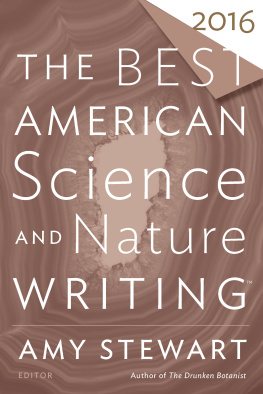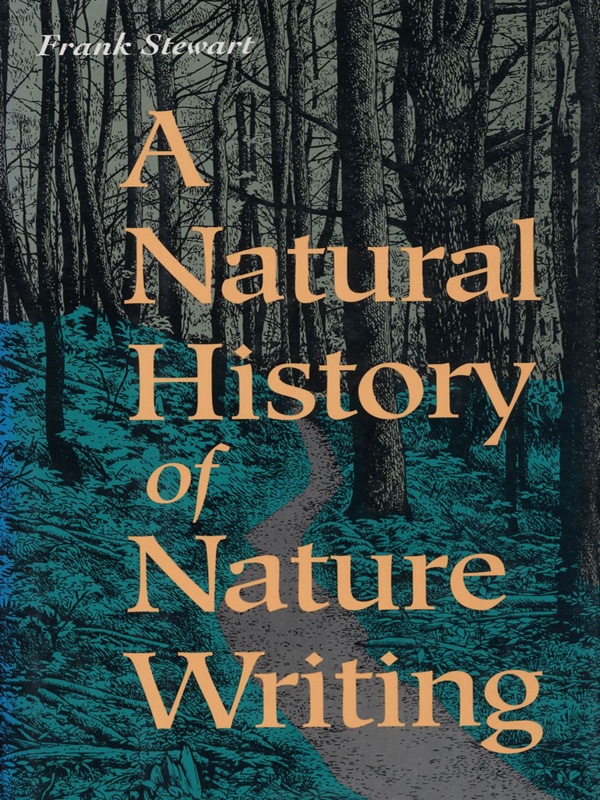My thanks foremost to Howard Boyer, whose encouragement, love of nature writing, and good judgment from the beginning have been of immeasurable help in completing this book. I thank Pat Matsueda for patiently and expertly reading drafts and suggesting ways to compress a complex history; Tom Farber for, among other gifts, a writers friendship; and Kathy Matsueda for proofreading and technical assistance. Ann Hawthorne provided keen, superb copyediting, for which I am most grateful.
Finally, I can hardly begin to thank Lisa Erb, because of whom, as Thoreau said, I have never got over my surprise that I should have been born into the most estimable place in all the world, and in the very nick of time.
NOTES
Notes to Chapter One
Henry Seidel Canby, Thoreau: The Biography of a Man Who Believed in Doing What He Wanted (Boston: Beacon Press, 1939), p. 294.
William Howarth, The Book of Concord: Thoreaus Life as a Writer (New York: Viking Press, 1982), p. 61.
Edith Peairs, The Hound, the Bay Horse, and the Turtle Dove: A Study of Thoreau and Voltaire, PMLA 52, no. 3 (Sept. 1937): 863-69.
Henry David Thoreau, The Journal of Henry D. Thoreau , ed. Bradford Torrey and Francis H. Allen, 14 vols. (Boston: Houghton Mifflin, 1906; reprint, Salt Lake City: Peregrine Smith,1984), May 31,1853.
Henry Thoreau, The Natural History of Massachusetts, in The Natural History Essays (Salt Lake City: Peregrine Smith, 1980), p. 29.
Thoreau, Journal , Aug. 19,1851.
Ibid.
Ibid., June 6,1851.
Ibid., May 31,1853.
Quoted in Robert D. Richardson, Jr., Henry Thoreau: A Life of the Mind (Berkeley: University of California Press, 1986), p. 247.
Quoted in ibid., p. 250.
Thoreau, Journal , June 7,1851.
Ibid., July 23,1851.
William C. Johnson, Jr., What Thoreau Said: Walden and the Unsayable (Moscow: University of Idaho Press, 1991), p. XVI.
Thoreau, Journal , Dec. 20, 1851, quoted in Johnson, What Thoreau Said , p. 64.
Thoreau, Journal , Sept. 2,1851.
Henry D. Thoreau, The Correspondence of Henry David Thoreau, ed. Walter Harding and Carl Bode (New York: New York University Press, 1985), p. 125. See also Henry Golemba, Thoreaus Wild Rhetoric (New York: New York University Press, 1990), p. 106.
Thoreau, Journal , June 23, 1840.
Johnson, What Thoreau Said , p. 151.
Notes to Chapter Two
Gilbert White, The Natural History and Antiquities of Selborne, in the County of Southampton (London: Benjamin White & Son,1789); reprint, ed. Richard Mabey (New York: Penguin, 1987), p. 140.
Quoted in Walter S. Scott, White of Selborne and His Times (London: John Westhouse, 1946), pp. 12528.
White, Natural History, p. 139.
Ibid., p. 122.
Quoted in Paul G.M. Foster, Gilbert White and His Records: A Scientific Biography (London: Christopher Helm, 1988), p.130.
See Donald Worster, Natures Economy: A History of Ecological Ideas (New York: Cambridge University Press, 1977), pp. 3-25. See also Roderick Frazier Nash, The Rights of Nature (Madison: University of Wisconsin Press, 1989), pp. 22-24.
Foster, Gilbert White , p. 159.
Quoted in John Hildebidle, Thoreau: A Naturalists Liberty (Cambridge, Mass.: Harvard University Press, 1983), p. 33.
Virginia Woolf, Whites Selborne, in The Captains Death Bed (London: Hogarth Press, 1950), p. 23; quoted in W.J. Keith, The Rural Tradition: A Study of the Non-fiction Prose Writers of the English Countryside (Toronto: University of Toronto Press, 1974), p. 56.
White, Natural History , p. 136.
Ibid., pp. 65, 81.
Quoted in Keith, The Rural Tradition, p. 55.
Hildebidle, Thoreau, pp. 24-39.
Woolf, Whites Selborne, p. 20; quoted in Keith, The Rural Tradition, p. 52.
White, Natural History, p. 93.
Charles Darwin, The Voyage of the Beagle, ed. Leonard Engel (Garden City, N.Y.: Doubleday, 1962), p. xxiii; quoted in Hildebidle, Thoreau, pp. 30-31.
Hildebidle, Thoreau, pp. 24-31.
Worster, Natures Economy , p. 5.
David Elliston Allen, The Naturalist in Britain: A Social History (London: Allen Lane, 1976), p. 99.
Ibid., p. 50.
Ibid., pp. 50-51.
Worster, Natures Economy, p. 16.
Thoreau, Correspondence, pp. 309-10.
MS, New York Public Library, quoted in Walter Harding, The Days of Henry Thoreau: A Biography (New York: Dover, 1982), pp. 243-44; Thoreau, Correspondence , p. 453; MS, Concord Library, quoted in Henry Seidel Canby, Thoreau (Boston: Beacon Press, 1939), p. 433.
Richardson, Henry Thoreau , p. 309.
White, Natural History, p. 125.
Thoreau, Journal , Nov. 12,1853.
Richardson, Henry Thoreau, p. 309.
Thoreau, Journal, April 19 and May 6,1854. See Richardson, Henry Thoreau, pp. 30910.
Quoted in Worster, Natures Economy , p. 64.
Quoted in Fritz Oehlschlaeger and George Hendrick, eds., Toward the Making of Thoreaus Modern Reputation (Urbana: University of Illinois Press, 1979), p. 111.
Hildebidle, Thoreau, p. 46.
See ibid., p. 47.
Thoreau, Journal, Nov. 9, 1851; quoted in Golemba, Thoreaus Wild Rhetoric, p. 2.
Thoreau, Journal, Nov. 5,1857.
See Golemba, Thoreaus Wild Rhetoric, pp. 198-99.
Notes to Chapter Three
Thoreau, Journal, Nov. 30,1858.
Ibid.
See H. Daniel Peck, Thoreaus Morning Work: Memory and Perception in A Week on the Concord and Merrimack River , the Journal , and Walden (New Haven: Yale University Press, 1990), p. 50.
Thoreau , Journal , Dec. 25, 1851.
Ibid., Nov. 30, 1858.
Peck, Thoreaus Morning Work , pp. 65-66.
Ibid., p. 53.
See ibid., passim.
Thoreau, Journal, Nov. 1, 1851.
See F. O. Matthiessen, American Renaissance: Art and Expression in the Age of Emerson and Whitman (New York: Oxford University Press, 1941), for a discussion of seeing among nineteenth-century American writers.
Thoreau, Journal, March 15, 1842.
Ibid., April 10, 1841.
Ibid., Nov. 1, 1851.
Ibid., Sept. 13, 1852. See also Naomi J. Miller, Seer and Seen: Aspects of Vision in Thoreaus Cape Cod, ESQ 29 (1983): 19091.
See Joel Porte, Emerson and Thoreau: Transcendentalists in Conflict (Middletown, Conn.: Wesleyan University Press, 1966); idem, Emerson, Thoreau, and the Double Consciousness, NEQ 41 (1968):40-50; and Edward Wagenknecht, Henry David Thoreau: What Manner of Man? (Amherst: University of Massachusetts Press, 1981), pp. 123-54.
Thoreau, Journal, Oct. 27, 1858.
Ibid.
John Ruskin, Modern Painters, Volume Two (1846; New York: John Wiley and Sons, 1884); pt. 3, sec. 1, chap.1, p. 5; quoted in Richardson, Henry Thoreau , p. 359.
Thoreau, Journal, Aug. 22, 1851.
John Ruskin, The Elements of Drawing & The Elements of Perspective (London: Dutton, 1907; first published 1857), p. 103.
Originally in Thoreau, Journal , March 15, 1842.
Ruskin, The Elements of Drawing, p. 100.
Thoreau, Journal, Oct. 6,1857; see Wagenknecht, Henry David Thoreau , pp.34, 151-54.
Thoreau, Journal, Oct. 6, 1858.
Henry David Thoreau, Autumnal Tints, in The Natural History Essays (Salt Lake City: Peregrine Smith, 1980), pp. 137-77. The other essays were Life without Principles, Walking, and Wild Apples.
Thoreau, Autumnal Tints, p. 174.
See Wagenknecht, Henry David Thoreau, p.153; and Peck, Thoreaus Morning Work , p. 97.
William Gilpin, Observations on the River Wye... 1770, quoted in Hans Huth, Nature and the American: Three Centuries of Changing Attitudes (Lincoln: University of Nebraska Press, 1957), p. 12.

